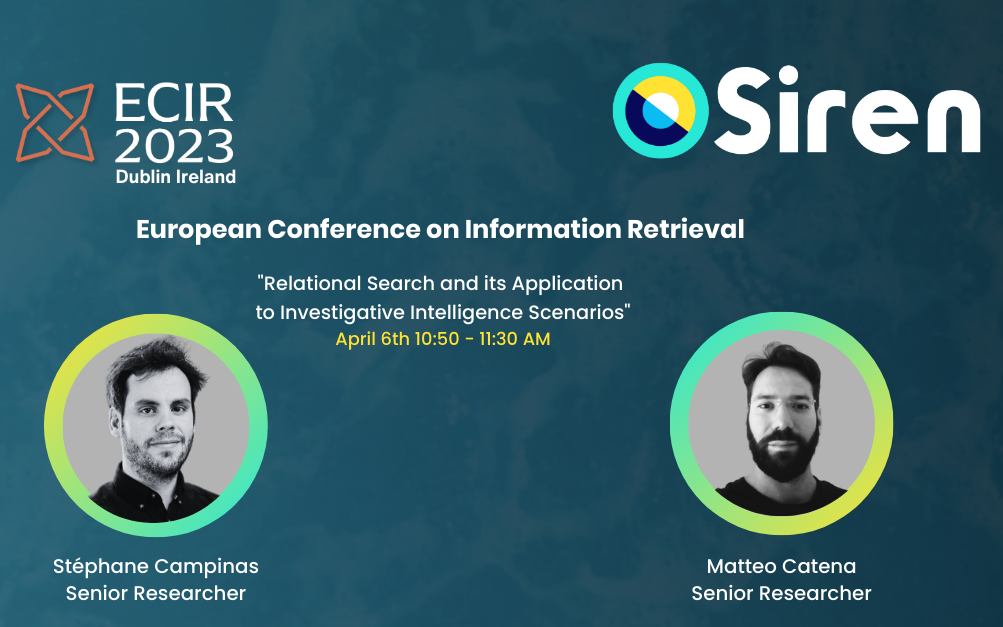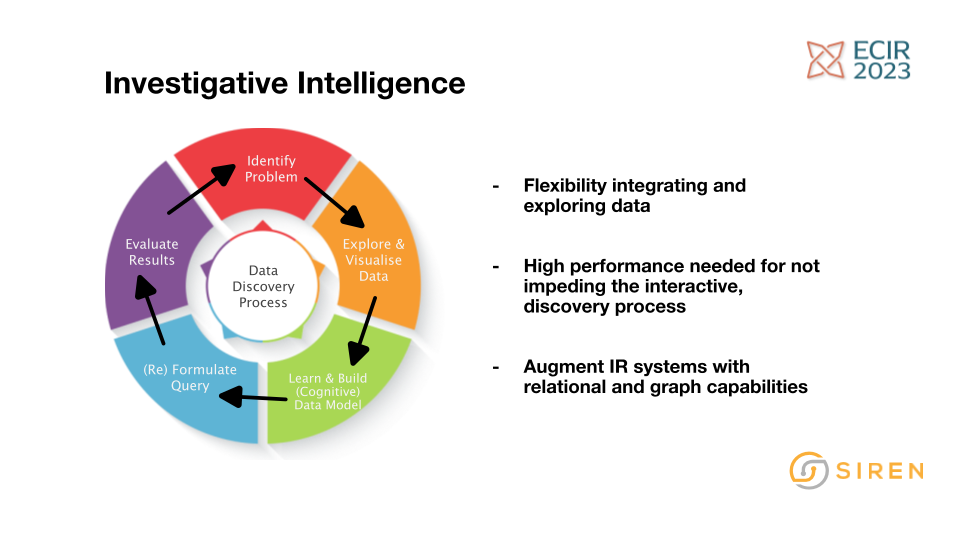
We are excited that Stéphane Campinas will talk about “Relational Search and its Application to Investigative Intelligence Scenarios” at the European Conference on Information Retrieval (ECIR). Stéphane will be presenting on April 6th, 2023, during the conference’s Industry Day. The conference is a premier European forum for the presentation of new research results in the field of Information Retrieval. Stéphane will be discussing how data-driven investigation intelligence systems are critical to the Intelligence and Defense domains to detect and prevent existing, evolving, and emerging threats and criminal activities. In particular, he will illustrate what are some of the technical and usability challenges that Investigative Intelligence poses.
The ever-increasing volume and complexity of information forms a fertile ground for malicious actors to blend in and operate, hence investigative systems must provide intuitive and scalable ways to search, explore, and analyze large relational datasets. With information that is often interconnected in essence, such systems rely on a mixed workload of search, data and graph analytics to support users in examining records and their relationships from different perspectives. Finally, analysts often interact with the system by following an explorative and iterative process that represents their train of thoughts. Therefore, investigative systems must have fast response times to avoid impeding the mental process of the analysts.
One of the main challenges of building a data-driven investigation intelligence system is the flexibility to handle diverse data sources, including unstructured, semi-structured, and structured data. Investigative systems must integrate new data sources quickly and with minimum effort. The Siren’s platform addresses this challenge by providing a flexible data model that allows analysts to define relationships between records. Analysts can then use this data model to connect and integrate new data sources seamlessly, ensuring the platform remains up-to-date and relevant.

Another challenge is the flexibility to handle various data interaction patterns. Investigative scenarios often require multiple data interaction paradigms to view and manipulate data from different perspectives. To address this, Siren provides a set of data interaction paradigms, such as search, analytic dashboard, set-to-set navigation, and graph visualization, which analysts can combine into a unified and coherent interaction model. Set-to-set navigation helps analysts to express their information need visually by connecting different areas of interest. Applying filters on a set has an impact on all (in)directly connected sets, allowing an analyst to view only the relevant information for a given need. Graph visualization helps an analyst have an overview of the computed sets to see if any patterns or clusters emerge.
Speed and scalability are also crucial to investigative intelligence systems. Analysts need fast response times to avoid impeding their mental process. During the investigation workflow, what we want is to click on a button and get the results right away, regardless of the size or complexity of the data. Siren addresses this challenge by leveraging the relational search capabilities provided by the Federate plugin, built on a semi-join operation between inverted indices at query time and an efficient caching mechanism. This enables complex tasks such as extracting the shortest paths between entities in a graph.
With roots in Information Retrieval research applied to the faceted exploration of Linked Data [1, 2], Siren’s platform represents the future of investigative intelligence. Our platform provides analysts with several data interaction paradigms and allows them to define their data model, connect new data sources, and process data at high speed and scalability. We have developed Siren with these challenges in mind and continue to evolve the platform to meet the evolving needs of our clients.
In his talk, Stéphane will present how some of the challenges in Investigative Intelligence are addressed by the Investigate platform: (a) how it enables analysts to define their own data model describing relationships between records, (b) how the set-to-set navigation supports exploration and an interactive definition of one’s information need, and (c) how the graph visualization can be used to highlight patterns in the data.
Look for us at the event, we would be delighted to discuss this topic in further detail.
1. E. Oren, R. Delbru, and S. Decker. Extending faceted navigation for RDF data. In Proceedings of the 5th International Semantic Web Conference (ISWC). November 2006.
2. R. Delbru, S. Campinas, and G. Tummarello. Searching Web Data: An Entity Retrieval and High-Performance Indexing Model. In Journal of Web Semantics (JWS). 2012.



